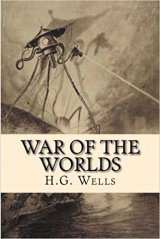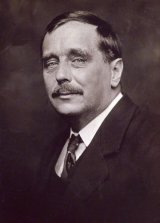The War of the Worlds Page #17
The War of the Worlds is a science fiction novel by English author H. G. Wells first serialised in 1897 by Pearson's Magazine in the UK and by Cosmopolitan magazine in the US.
When for a moment I raised my head to take breath and throw the hair and water from my eyes, the steam was rising in a whirling white fog that at first hid the Martians altogether. The noise was deafening. Then I saw them dimly, colossal figures of grey, magnified by the mist. They had passed by me, and two were stooping over the frothing, tumultuous ruins of their comrade. The third and fourth stood beside him in the water, one perhaps two hundred yards from me, the other towards Laleham. The generators of the Heat-Rays waved high, and the hissing beams smote down this way and that. The air was full of sound, a deafening and confusing conflict of noises--the clangorous din of the Martians, the crash of falling houses, the thud of trees, fences, sheds flashing into flame, and the crackling and roaring of fire. Dense black smoke was leaping up to mingle with the steam from the river, and as the Heat-Ray went to and fro over Weybridge its impact was marked by flashes of incandescent white, that gave place at once to a smoky dance of lurid flames. The nearer houses still stood intact, awaiting their fate, shadowy, faint and pallid in the steam, with the fire behind them going to and fro. For a moment perhaps I stood there, breast-high in the almost boiling water, dumbfounded at my position, hopeless of escape. Through the reek I could see the people who had been with me in the river scrambling out of the water through the reeds, like little frogs hurrying through grass from the advance of a man, or running to and fro in utter dismay on the towing path. Then suddenly the white flashes of the Heat-Ray came leaping towards me. The houses caved in as they dissolved at its touch, and darted out flames; the trees changed to fire with a roar. The Ray flickered up and down the towing path, licking off the people who ran this way and that, and came down to the water's edge not fifty yards from where I stood. It swept across the river to Shepperton, and the water in its track rose in a boiling weal crested with steam. I turned shoreward. In another moment the huge wave, well-nigh at the boiling-point had rushed upon me. I screamed aloud, and scalded, half blinded, agonised, I staggered through the leaping, hissing water towards the shore. Had my foot stumbled, it would have been the end. I fell helplessly, in full sight of the Martians, upon the broad, bare gravelly spit that runs down to mark the angle of the Wey and Thames. I expected nothing but death. I have a dim memory of the foot of a Martian coming down within a score of yards of my head, driving straight into the loose gravel, whirling it this way and that and lifting again; of a long suspense, and then of the four carrying the debris of their comrade between them, now clear and then presently faint through a veil of smoke, receding interminably, as it seemed to me, across a vast space of river and meadow. And then, very slowly, I realised that by a miracle I had escaped. CHAPTER THIRTEEN HOW I FELL IN WITH THE CURATE After getting this sudden lesson in the power of terrestrial weapons, the Martians retreated to their original position upon Horsell Common; and in their haste, and encumbered with the debris of their smashed companion, they no doubt overlooked many such a stray and negligible victim as myself. Had they left their comrade and pushed on forthwith, there was nothing at that time between them and London but batteries of twelve-pounder guns, and they would certainly have reached the capital in advance of the tidings of their approach; as sudden, dreadful, and destructive their advent would have been as the earthquake that destroyed Lisbon a century ago. But they were in no hurry. Cylinder followed cylinder on its interplanetary flight; every twenty-four hours brought them reinforcement. And meanwhile the military and naval authorities, now fully alive to the tremendous power of their antagonists, worked with furious energy. Every minute a fresh gun came into position until, before twilight, every copse, every row of suburban villas on the hilly slopes about Kingston and Richmond, masked an expectant black muzzle. And through the charred and desolated area--perhaps twenty square miles altogether--that encircled the Martian encampment on Horsell Common, through charred and ruined villages among the green trees, through the blackened and smoking arcades that had been but a day ago pine spinneys, crawled the devoted scouts with the heliographs that were presently to warn the gunners of the Martian approach. But the Martians now understood our command of artillery and the danger of human proximity, and not a man ventured within a mile of either cylinder, save at the price of his life. It would seem that these giants spent the earlier part of the afternoon in going to and fro, transferring everything from the second and third cylinders--the second in Addlestone Golf Links and the third at Pyrford--to their original pit on Horsell Common. Over that, above the blackened heather and ruined buildings that stretched far and wide, stood one as sentinel, while the rest abandoned their vast fighting-machines and descended into the pit. They were hard at work there far into the night, and the towering pillar of dense green smoke that rose therefrom could be seen from the hills about Merrow, and even, it is said, from Banstead and Epsom Downs. And while the Martians behind me were thus preparing for their next sally, and in front of me Humanity gathered for the battle, I made my way with infinite pains and labour from the fire and smoke of burning Weybridge towards London. I saw an abandoned boat, very small and remote, drifting down-stream; and throwing off the most of my sodden clothes, I went after it, gained it, and so escaped out of that destruction. There were no oars in the boat, but I contrived to paddle, as well as my parboiled hands would allow, down the river towards Halliford and Walton, going very tediously and continually looking behind me, as you may well understand. I followed the river, because I considered that the water gave me my best chance of escape should these giants return. The hot water from the Martian's overthrow drifted downstream with me, so that for the best part of a mile I could see little of either bank. Once, however, I made out a string of black figures hurrying across the meadows from the direction of Weybridge. Halliford, it seemed, was deserted, and several of the houses facing the river were on fire. It was strange to see the place quite tranquil, quite desolate under the hot blue sky, with the smoke and little threads of flame going straight up into the heat of the afternoon. Never before had I seen houses burning without the accompaniment of an obstructive crowd. A little farther on the dry reeds up the bank were smoking and glowing, and a line of fire inland was marching steadily across a late field of hay. For a long time I drifted, so painful and weary was I after the violence I had been through, and so intense the heat upon the water. Then my fears got the better of me again, and I resumed my paddling. The sun scorched my bare back. At last, as the bridge at Walton was coming into sight round the bend, my fever and faintness overcame my fears, and I landed on the Middlesex bank and lay down, deadly sick, amid the long grass. I suppose the time was then about four or five o'clock. I got up presently, walked perhaps half a mile without meeting a soul, and then lay down again in the shadow of a hedge. I seem to remember talking, wanderingly, to myself during that last spurt. I was also very thirsty, and bitterly regretful I had drunk no more water. It is a curious thing that I felt angry with my wife; I cannot account for it, but my impotent desire to reach Leatherhead worried me excessively.
Translation
Translate and read this book in other languages:
Select another language:
- - Select -
- 简体中文 (Chinese - Simplified)
- 繁體中文 (Chinese - Traditional)
- Español (Spanish)
- Esperanto (Esperanto)
- 日本語 (Japanese)
- Português (Portuguese)
- Deutsch (German)
- العربية (Arabic)
- Français (French)
- Русский (Russian)
- ಕನ್ನಡ (Kannada)
- 한국어 (Korean)
- עברית (Hebrew)
- Gaeilge (Irish)
- Українська (Ukrainian)
- اردو (Urdu)
- Magyar (Hungarian)
- मानक हिन्दी (Hindi)
- Indonesia (Indonesian)
- Italiano (Italian)
- தமிழ் (Tamil)
- Türkçe (Turkish)
- తెలుగు (Telugu)
- ภาษาไทย (Thai)
- Tiếng Việt (Vietnamese)
- Čeština (Czech)
- Polski (Polish)
- Bahasa Indonesia (Indonesian)
- Românește (Romanian)
- Nederlands (Dutch)
- Ελληνικά (Greek)
- Latinum (Latin)
- Svenska (Swedish)
- Dansk (Danish)
- Suomi (Finnish)
- فارسی (Persian)
- ייִדיש (Yiddish)
- հայերեն (Armenian)
- Norsk (Norwegian)
- English (English)
Citation
Use the citation below to add this book to your bibliography:
Style:MLAChicagoAPA
"The War of the Worlds Books." Literature.com. STANDS4 LLC, 2025. Web. 11 Jan. 2025. <https://www.literature.com/book/the_war_of_the_worlds_43>.




Discuss this The War of the Worlds book with the community:
Report Comment
We're doing our best to make sure our content is useful, accurate and safe.
If by any chance you spot an inappropriate comment while navigating through our website please use this form to let us know, and we'll take care of it shortly.
Attachment
You need to be logged in to favorite.
Log In